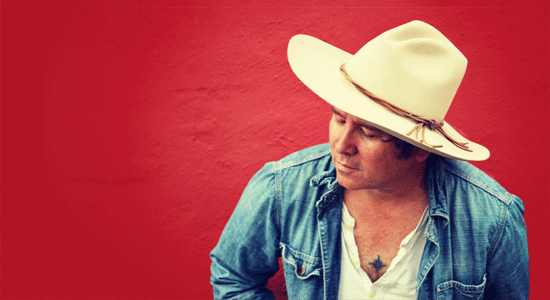
Grant-Lee Phillips makes a move to Nashville and one of his best albums to date
Grant-Lee Phillips’ new LP, The Narrows, is a core sample of his life experiences, influences and previous musical accomplishments, with Grant Lee Buffalo in the ’90s and as a prolific solo artist after the band’s 1999 dissolution. It’s also a reflection of he and his wife’s move to Nashville two years ago in order to raise their daughter in a saner atmosphere than Los Angeles, where Phillips has lived since the early ’80s.
“L.A.’s an intense place,” says Phillips. “Obviously, I have a love and tolerance for it. A lot of our friends had moved, and we said, ‘Maybe Nashville.” Where people open the door for one another and say, ‘Thank you,’ and all that old-fashioned stu ff. L.A. has a hard time, but in their defense, they’ve always got a few coffees in each hand.”
Phillips began thinking about the songs for The Narrows toward the end of 2013, the year after his seventh solo release, Walking In The Green Corn. Although still living in L.A., Southern gentility and a slower pace crept into Phillips’ writing; he cranked out Band-tinted folk hymn “Holy Irons” and GLB-infused “Tennessee Rain” before relocating. Once established in Nashville, Phillips’ songs took their water from a deeper, sadder well.
“My dad’s health took a real plunge, and he passed away in the fall,” says Phillips. “There were a few songs in that period, some right before and some after.”
Phillips credits the extended time between songwriting and recording for his satisfaction with The Narrows. In many ways, the new album was recorded in a similar fashion to Grant Lee Buffalo’s sterling ’90s output, with quick studio sessions wedged into hectic touring schedules.
“I lived with it a bit longer before I called it done,” says Phillips. “I’d been writing a lot, and we did a quick session, and in a couple of days, we tracked 12 of the songs—then I went back on the road. It was a bit like the old days with Grant Lee Bu alo. We would give ourselves a week or so to make a record, but most of our time was spent touring, so we couldn’t overthink things, which was probably healthy.”
Subsequently, The Narrows, recorded at Dan Auerbach’s Nashville studio, plays like a hybrid of Phillips’ dual creative identities: electric shaman and acoustic troubadour (a role he played to perfection on Gilmore Girls).
“It satisfied what I was hoping it would satisfy,” says Phillips. “Something very earthy and human that represented both sides of what I do: the reflective, introverted side and the harder side, as well.”
Phillips also professes a great love of Levon Helm and the Band (“And I think of it in those terms,” he says), as well as the country renegades of his parents’ generation.
“The Band has always been a touchstone for me,” he says. “It’s almost like an American Beatles, I suppose—a group that produced a universe that is complete and impossible to puncture. I believe every word. And I’ve always had a soft spot for music I associate with the South, with Nashville; Cash, Haggard, Willie, all the guys that probably got booed off the Ryman stage back in the day. The outlaws and weirdos, in that sense. I think we all have that lingering sense that part of us feels alone in the world and wrestles with the rule book, and then out walks a Cash or a David Bowie, who represents all the outcasts and terrestrial aliens walking around.”
The Narrows finds Phillips returning to the trio format with bassist Lex Price and drummer Jerry Roe, grandson of country great Jerry Reed, who had offered to help Phillips make a record in Nashville, but advised him against moving there (“I do want to make a record, and I ignored the other part,” Phillips told Roe). The trio configuration seems to be Phillips’ sweet spot.
“There’s a point where I step away from the microphone and express it through the guitar, and with a trio I can easily do that,” says Phillips. “I think it’s just enough and sometimes it’s almost too much. I’ve had that chance to play with a larger band, and it can be so great, but I always find that I’m saying, ‘That’s great, do even less of that.’ I was always crying out that it would be nice to have an extra player in Grant Lee Bu alo, but it was hard enough to corral a trio. Maybe the songs just work better in that fashion. I’m not certain. I’ll figure it out.”
—Brian Baker






